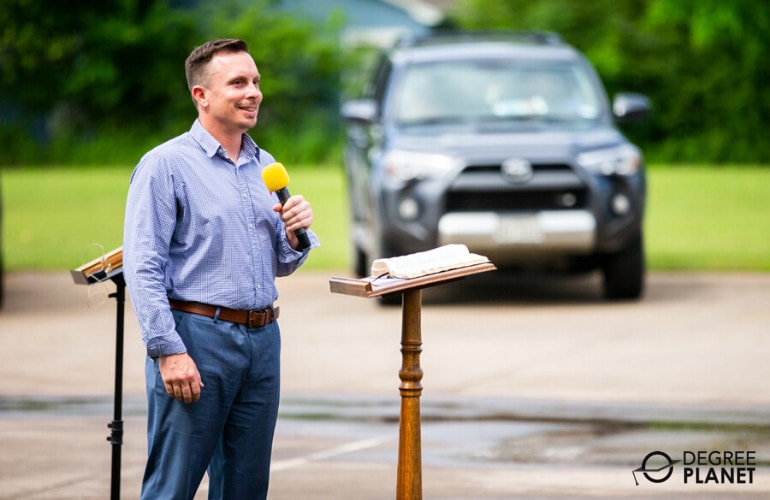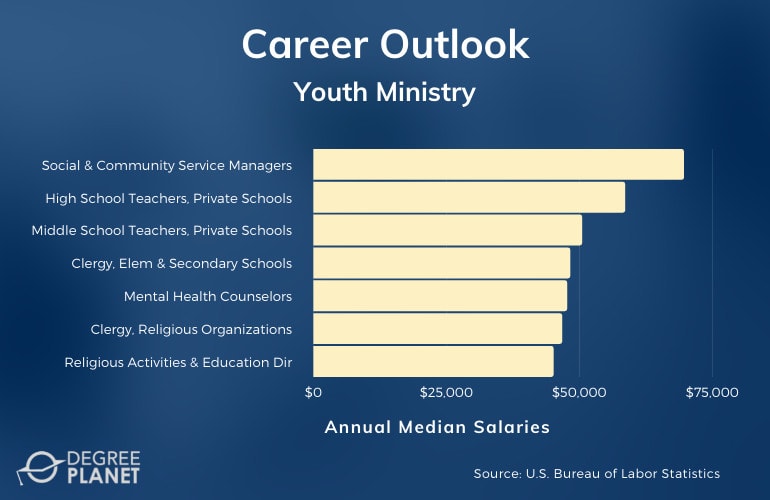Online youth ministry degree programs can help prepare you to enter into rewarding youth ministry roles, to serve God, and to build a pathway to ordination.

You can learn from highly accomplished pastors and leaders and explore your calling alongside other inspired Christians.
Editorial Listing ShortCode:
With expert training and mentoring, youth ministry can be deeply transformative—for the youth as well as for the ministers.
Online Youth Ministry Degrees
Youth ministry degree programs prepare prospective youth ministers to lead Christian youth with joy and confidence.
Editorial Listing ShortCode:
Youth ministry programs can help equip you to teach biblical concepts and facilitate young people’s own processes of learning. From questioning to interpreting the Bible, they may grow spiritually as they’re nurtured by you and other Christians.
In a youth ministry program, you can:
- Learn about core biblical teachings and concepts
- Get insights into developmental psychology and pedagogy
- Explore ethical principles for mentoring young congregants
- Learn practical communication and program coordination skills
Many Christians who feel called to ministry find youth ministry to be an effective way to explore ministry work and develop their pastoral skills. So, getting into a youth ministry degree program online could be a strategic way to set yourself up for more rewarding experiences and career outcomes.
Youth Ministry Careers & Salaries

While a youth minister degree program can equip students for a very specific job role, it can also impart valuable teaching, leadership, collaboration, and organizational skills.
In fact, working as a youth minister can also help you further develop valuable soft skills and relational talents. For many Christians, this work is also spiritually fulfilling. Some graduates use their youth ministry training to go on to specialize in education, counseling, or social work, just to name a few possibilities.
According to the Bureau of Labor Statistics, strong interpersonal skills, solid ethical training, and well-developed teaching and mentoring skills can be utilized in both Christian and secular settings.
| Careers | Annual Median Salaries |
| Social and Community Services Managers | $69,600 |
| High School Teachers, Private Schools | $58,550 |
| Middle School Teachers, Private Schools | $50,470 |
| Clergy, Elementary and Secondary Schools | $48,240 |
| Substance Abuse, Behavioral Disorder, and Mental Health Counselors | $47,660 |
| Clergy, Religious Organizations | $46,720 |
| Religious Activities and Education Directors | $45,110 |
| Social and Human Service Assistants | $35,960 |
| Coaches and Scouts, Private Elementary and Secondary Schools | $33,710 |
| Religious Workers | $33,530 |
Youth ministry degree programs can help you explore your own spiritual gifts and offer you rich fellowship and networking opportunities. You can also develop leadership, communication, and interpersonal skills.
Editorial Listing ShortCode:
Based on what you learn about yourself by training in youth ministry, you might pursue ordination and pastoral careers, or you might discover other Christian or secular career paths that align with your skill sets.
Youth Ministry Major Curriculum & Courses

The courses that are offered in your program will depend on the school you choose, but here’s a list of the kinds of courses you’re likely to encounter:
- Foundations of Biblical Instruction: This course is a broad exploration of the Christian worldview and core biblical themes.
- Evangelism and the Early Church: Rooted in the New Testament Book of Acts and Paul’s epistles, this course explores themes related to church building, discipleship, Christian outreach, and biblically informed spiritual formation.
- Developmental Psychology: You’ll study secular and biblical concepts of childhood and adolescent development from an educational perspective.
- Old Testament Studies: You’ll learn about Old Testament themes and passages, especially those that build a foundation for key Christian beliefs and ethical principles.
- New Testament Theology: This class focuses on key features of New Testament scripture and theology, including Jesus of Nazareth and his ministry, the writings of the Apostle Paul, and key areas of contrast between Old and New Testament theology.
- Caring Ministries: Incorporating both biblical principles and secular methods, this course explores helping others deal with personal challenges, social conflicts, and feelings of loss and grief.
- Multicultural Christian Education: This class explores the dynamics of working with different kinds of faith populations and includes an introduction to inter-faith perspectives and dialogue.
- Ethical Principles in Pastoral Leadership: You’ll learn about scriptural guidelines, best practices, and ethical principles for providing authentic and supportive interactions with students, congregants, and colleagues.
- Worship Arts: You’ll learn to apply knowledge of church liturgy, Scripture, contemporary culture, and your own creative passions to help inspire and format traditional, contemporary, or blended worship services.
- Christian Communication: This course is an overview of the institutional structures, ministries, and methods fostering effective Christian outreach, communication, and educational programming.
Youth leaders with a bachelors in youth ministry may find themselves well equipped for more on-the-job training.
How to Choose an Online Youth Ministry Degree Program

When trying to find an online Christian ministry degree program that’s right for you, it can help to reflect on your own educational goals and interests. You can also consider the following when comparing schools and programs:
- Curriculum offerings. As you compare schools, it’s beneficial to consider what kinds of academic topics and perspectives are emphasized in different online bachelor’s degree programs.
- Accreditation and reputation. Credible degrees come from fully accredited schools. You can also try to find testimonials from former program graduates, and you can ask your church’s leaders if they recommend some schools over others. This may allow you to feel more confident about choosing a school with integrity, academic rigor, and good student support services.
- Tuition. With online options, you may have more choices when it comes to schools and competing tuition rates. Many state schools offer significant in-state discounts for students who meet the residency requirements.
- School and program affiliation. Different institutions that offer a major in youth ministry often have Christian affiliations, while others may have a secular orientation. Some schools even represent specific denominations. You may want to determine whether you prefer a learning environment aligned with a specific denomination or prefer a learning environment with more diverse influences and academic perspectives.
As you explore different programs, you can look for additional points of comparison and can use the above list to help you reflect on what factors matter most to you.
How to Become a Youth Pastor

Some basic qualifications that can help you become a youth pastor might include employment and character references, biblical knowledge, and an ability to encourage, support, and lead young people and group activities.
While local churches may have different expectations for their leaders, here are some of the common steps on the road to becoming a youth pastor:
- Academic training. Actual academic requirements will vary, but not all youth ministry jobs require a bachelor’s degree. That said, getting a bachelors in youth ministry degree online can be a convenient way to prepare spiritually and practically for serving in or leading youth ministry programs.
- Youth ministry experience. Some prospective youth ministers start as volunteers, interns, or paid staff in youth ministry positions at a local church. In addition, some parachurch organizations also sponsor school-focused youth ministry programs. Christian camps need talented and passionate youth leaders as well.
- Skill building. As you develop your skills, you can look for opportunities to work in different youth ministry roles. This might include leading camp activities, directing youth choirs, designing youth programs, helping lead study groups, delivering sermons, and deepening your own biblical scholarship.
With or without a degree, taking on new experiences, even as a volunteer, can help you hone your interpersonal and professional communication skills along with your programming, collaboration, and mentoring abilities.
Admissions Requirements

Much like with pastoral counseling degrees online, admissions requirements vary by university and program, but here are some common requirements for pastoral ministry degrees online:
- SAT or ACT scores (only some schools require them). Satisfactory SAT or ACT scores can help you demonstrate your academic readiness. They may also help you overcome other obstacles to admissions, such as lackluster grades on your high school transcript.
- High school diploma. Admissions officers will ask for a copy of your high school diploma or a diploma equivalent, such as an overseas diploma or a GED certificate.
- Satisfactory GPA. Not all programs require a minimum GPA, but many do. The minimum specified GPA can vary, often ranging between 2.5 and 3.5.
- Letters of recommendation. It’s very common to be asked to submit letters of recommendation. You might consider asking past teachers, pastors, or coaches who can speak to your gifts, character, and sense of vocational purpose or passion.
If you have questions about admissions or unusual circumstances, you can reach out to your prospective school’s admissions office for guidance and more information.
Accreditation

It can be strategic to only consider fully accredited schools and programs. By choosing an accredited school, you can be more confident about the quality of academic instruction and academic support the school will offer. Regional accreditation typically offers the best assurances.
Accreditation can also be a precondition for some forms of financial aid. In addition, course credits and bachelor’s degrees from accredited institutions are more likely to be honored by licensing boards, other institutions of higher learning, and prospective employers.
Editorial Listing ShortCode:
The Council for Higher Education Accreditation (CHEA) offers information about accreditation and how to find accredited schools.
Youth Ministry Licensure and Certifications

Many youth ministers start without a license and use youth ministry opportunities to develop their pastoral skills. Typically, ordination is a key step to becoming a pastor and church leader.
Ordination requirements can vary depending on the denomination and local church. Common requirements include earning a master’s degree in theology or divinity and gaining ministry experience through volunteering, internships, or paid staff positions.
Licensing may be required for some church leadership roles, but the licensing process is typically governed by state boards. Licensing is primarily required for officiating legally regulated rites, such as marriage ceremonies.
Financial Aid and Scholarships

Figuring out how to cover educational costs in the short term can be challenging, so many students often consider getting assistance in the form of financial aid. Common forms of aid include state and federal grants, scholarships, employer-based assistance, and student loans.
It’s beneficial to plan your financial decision-making carefully. It’s also helpful to review all financial aid offers carefully, as terms and conditions can vary. If you plan to apply for need-based aid, filling out the Free Application for Federal Student Aid (FAFSA) is often the first step.
What Is a Youth Ministry Degree?

A youth ministry degree is a course of study that typically includes biblical studies as well as the study of youth development and practical group programming and leadership methods.
This kind of liberal arts degree includes explicit teaching in Christian doctrine, biblical interpretation, and Christian education and outreach. These programs are often offered at Christian colleges, and some may be affiliated with specific denominations. For students looking for an online options, a number of online Christian colleges offer programs in youth ministry.
Many ordained pastors have begun their ministry careers working in youth ministry.
If you decide not to pursue a ministry career, a ministry degree program could still help you deepen your own spiritual formation and equip you with valuable skills for both Christian and secular settings.
Is a Youth Minister a Pastor?

Many youth ministers are ordained pastors, but this is not always the case. Some Christians work or volunteer in youth ministry roles before becoming ordained or while completing their masters in divinity.
Many leaders serve in various types of ministry roles and pursue graduate studies in divinity or theology as part of a larger ordination process. Working in youth ministry can be both intrinsically rewarding and a valuable step in preparing for ordination and senior pastor roles.
How Much Does a Youth Pastor Make?
While the Bureau of Labor Statistics does not specifically state the median salary for youth pastors, it does include the median annual salary for all clergy, which is $51,940. Most clergy earn between $28,410 and $89,510 each year.
Editorial Listing ShortCode:
Meanwhile, the median annual salary for religious activities and education directors is $45,110 (Bureau of Labor Statistics). How much you can earn as a youth pastor will also depend on your level of education, your work experience, your geographic location, and your employer.
What Are the Qualifications to Be a Youth Pastor?

If you’re working under the supervision of other pastors, then your role may have few formal requirements. Working with youth, though, typically requires excellent biblical knowledge, ethical standards, compassion, patience, and empathy.
Here are some common qualifications for youth pastors, depending on the church:
- College degree
- Submission of a compelling statement of faith
- Strong background in Christian studies and biblical interpretation
- Interpersonal, communication, and organizational skills
- Professional references and character references
Many aspiring youth pastors get exposure, training, and relevant experience by volunteering to work alongside more qualified youth ministers or serving as youth ministry interns.
What Type of Bachelors Degree Is Required for Youth Ministry?

Church or ministry program leaders often set their own guidelines and requirements for youth ministry positions. There are a number of churches that only require their youth ministers to hold a bachelors degree in a related field.
Many aspiring youth leaders major in youth ministry, divinity, theology, or pastoral studies. Senior roles may require ordination, which, in many denominations, requires graduate-level studies in theology or divinity. A growing number of universities also offer programs leading to a degree in theology online for students needing that option.
Checking with senior pastors and other ministry leaders in the denomination or organization you want to serve in can help you gain guidance for your specific situation.
What Can You Do with a Youth Ministry Degree?

With the right experience and qualifications, some graduates lead or support Christian education programs at a local church. Youth ministers may also lead Bible studies or Christian fellowship programs for younger children, teens, or even college students.
Some youth ministers take on a wide variety of roles. They may provide individual counseling and mentoring, help students succeed in school and friendships, lead youth choirs, organize and chaperone mission trips, preach to youth groups, or lead Bible studies.
People interested in youth ministry roles might also work for youth ministry and Christian outreach organizations. They might also fill youth ministry roles, teaching roles, or counseling roles in Christian camps or schools. Some graduates go on to earn their teaching credentials or counseling certification.
How Long Does It Take to Get a Bachelor’s Degree in Youth Ministry Online?

A bachelors degree program consists of general education courses and major-specific courses and requirements. It generally takes 4 years to complete a bachelors degree when enrolled full-time.
Some schools try to make it possible for students to finish in less time. For example, if a program follows an academic calendar with 8 week terms, you may able to earn your degree sooner with full-time, year-round enrollment. On the other hand, part-time studies can often extend your time to completion.
Is a Youth Ministry Degree Worth It?
Yes, a youth ministry degree is worth it for many students. This type of ministry program offers specialized training for working with the youth of a congregation.
Editorial Listing ShortCode:
Roles in youth ministry can typically provide a springboard for pursuing ordination and other pastoral roles as well. This kind of program can also equip you with skills that are applicable in counseling, social work, and education. Further specialized training can also help you qualify to work in these related fields.
Universities Offering Online Bachelors in Youth Ministry Degree Programs
Methodology: The following school list is in alphabetical order. To be included, a college or university must be regionally accredited and offer degree programs online or in a hybrid format.

Bethel University offers a Bachelor of Arts in Christian Ministries. The program is offered completely online. It requires the completion of 48 credit hours and can potentially be finished in just 18 months. Those interested in the program may apply online through the school’s website. Applicants must have 60 qualifying credit hours to transfer into the program.
Bethel University is accredited by the Higher Learning Commission.

Biola University offers an online Bachelor of Science in Biblical Ministries program. Each class is 7 weeks long. To graduate, students must complete 120 credit hours. Those interested in the program must submit an online application with an admissions essay and transcripts from all schools attended.
Biola University is accredited by the WASC Senior College and University Commission.

Boyce College offers a Bachelor of Science in Youth and Family Ministry. To graduate, students must complete 129 credit hours. Those interested in the program must submit a pastoral recommendation, a spiritual auto-biography, copies of their high school transcripts, and ACT, SAT, or CLT test scores.
Boyce College is accredited by the Southern Association of Colleges and Schools Commission on Colleges.

Cairn University offers an online Bachelor’s in Pastoral Ministry program. Students must complete 127 credit hours to graduate. To be eligible for the program, applicants must submit an online application with a personal essay, official high school transcripts, and ACT, SAT, or CLT test scores.
Cairn University is accredited by the Middle States Commission on Higher Education.

Charleston Southern University offers an online program for a Bachelor of Arts in Student Ministry. To graduate, students must complete 125 credit hours. Those interested in the program must submit an online application and official high school transcripts. ACT, SAT, or CLT test scores are optional but encouraged by the program’s admissions department.
Charleston Southern University is accredited by the Southern Association of Colleges and Schools Commission on Colleges.

Eastern University offers a Bachelor of Arts in Youth Ministry Leadership. The program can be completed online and is designed for adult learners. It can typically be completed in 2 years. Applicants may apply online. New students are accepted every 7 weeks. Those interested in the program must submit copies of their high school transcripts.
Eastern University is accredited by the Middle States Commission on Higher Education.

Faulkner University offers a Bachelor of Arts in Biblical Studies with an emphasis in Youth and Family Ministry in Alabama. Students must complete 122 credit hours to graduate. When applying, applicants must have a GPA of 2.75 or higher and need to submit references, official transcripts, and ACT or SAT test scores.
Faulkner University is accredited by the Southern Association of Colleges and Schools Commission on Colleges.

Grace College offers a Bachelor of Ministry Leadership. The program can be completed online, and students must complete 60 credit hours to graduate. Classes are taken two at a time, and each class is 8 weeks long. To be eligible for the program, applicants must have 60 qualifying credit hours with a GPA of 2.0 or higher.
Grace College and Theological Seminary is accredited by the Higher Learning Commission.

Grand Canyon University offers a Bachelor of Arts in Christian Studies with an emphasis in Youth Ministry. Each online class is 7 weeks long. Students must complete 120 credit hours to graduate. Applicants must submit official transcripts. ACT or SAT scores are required for applicants with a GPA of 2.5 or lower.
Grand Canyon University is accredited by the Higher Learning Commission.

Great Lakes Christian College offers a Bachelor of Science in Christian Leadership and Communication with a concentration in Youth Ministry. Each class is 7 weeks long. To graduate, students must obtain 120 credit hours. Applicants must have a high school GPA of 2.5 or higher and need to submit ACT or SAT test scores.
GLCC is accredited by The Higher Learning Commission.

Lancaster Bible College offers a Bachelor of Arts in Ministry Leadership designed for adult students. To graduate, students must complete 120 credit hours. Each class is 6 weeks long. Applicants must have a high school diploma with a GPA of 2.0 or higher.
Lancaster Bible College is accredited by the Middle States Commission on Higher Education.

Lee University offers a Bachelor of Ministry Leadership with an emphasis in Children’s Ministry. Students must complete 120 credit hours to graduate. Applicants must have a high school diploma and three years of experience after high school and submit official transcripts and ACT or SAT test scores.
Lee University is accredited by the Southern Association of Colleges and Schools Commission on Colleges.

Liberty University offers a Bachelor of Science in Youth Ministries. Students must complete 120 credit hours with a GPA of 2.0 or higher to graduate. A cognate of the student’s choice may be added to the degree. Those interested in the program may apply online through the school’s website. Applicants must provide proof of having a high school diploma.
Liberty University is accredited by the Southern Association of Colleges and Schools Commission on Colleges.

Moody Bible Institute offers a Bachelor of Science in Ministry Leadership with the option to add a concentration in Children and Family Ministry. Students must complete 120 credit hours. Applicants must submit two references, an autobiographical essay, SAT or ACT test scores, and official high school transcripts.
Moody Bible Institute is accredited by the Higher Learning Commission.

Mount Vernon Nazarene University offers an online program for a Bachelor of Arts in Christian Ministry. Each class is 6 weeks long. Students must complete 120 credit hours with a minimum GPA of 2.0. Applicants must submit an online application with official transcripts from all schools attended.
Mount Vernon Nazarene University is accredited by the Higher Learning Commission.

Oral Roberts University offers a Bachelor of Arts in Ministry and Leadership. Students may choose to add a concentration, such as Youth and Family Ministry or Evangelism and Outreach, to the program. An online application, official transcripts, and test scores must be submitted when applying. Applicants may contact an admissions representative if they have any questions.
Oral Roberts University is accredited by the Higher Learning Commission.

Point University offers an online program for a Bachelor of Science in Youth and Family Ministries. Students must complete 120 credit hours to graduate and may take as many classes per semester as they wish. To be eligible for the program, applicants must submit transcripts from all previously attended schools and have a minimum GPA of 2.0.
Point University is accredited by the Southern Association of Colleges and Schools Commission on Colleges.

Regent University offers an online program for a Bachelor of Arts in Christian Ministry. Students must complete 120 credit hours, including a senior seminar, with a GPA of 2.0 or higher to graduate. Those interested in the program must submit an admissions questionnaire, official transcripts, and copies of their government-issued ID.
Regent University is accredited by the Southern Association of Colleges and Schools Commission on Colleges.

Southeastern University offers a Bachelor of Science in Children, Youth, and Family Ministries. To graduate, students must complete 130 credit hours. To be eligible for the program, applicants must submit official high school transcripts, SAT or ACT test scores, an admissions essay, and a Christian character reference.
Southeastern University is accredited by the Southern Association of Colleges and Schools Commission on Colleges.

Toccoa Falls College offers a Bachelor of Youth Ministry degree. To graduate, students must complete 126 credit hours, including 42 hours related to Youth Ministries. Those interested in the program must submit an online application with a personal statement, high school transcripts, and ACT, SAT, or CLT test scores.
Toccoa Falls College is accredited by the Southern Association of Colleges and Schools Commission on Colleges.
Getting Your Youth Ministries Degree Online

Many Christians serve their church by volunteering and learning on the job. While this could help you develop ministry skills, earning a degree in youth ministries could expand your knowledge, advance your skill sets, and qualify you to serve in a leadership capacity.
If you wish to further your studies down the road, earning a youth ministry degree can also prepare you for graduate studies at a seminary or university. There are many accredited universities that offer online degrees in youth ministry and various course designs.
So, why wait? You can start exploring youth ministry degrees today to find the program that best aligns with your learning preferences and career goals.

